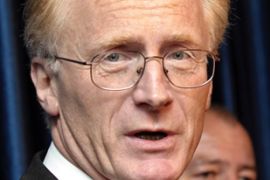UN Afghan head calls for change
Outgoing Kai Eide tells Security Council a more politically focused strategy is needed.

Afghan control
“[There should be] an acceleration of the training and mentoring of the army and a gradual transfer of authority from the international to the Afghan security forces,” he said.
“This will be the first step in a new transition strategy which will allow the Afghans to be in charge of their future.
“However, this transition strategy must include key transition areas. The systematic build-up of civilian institutions to enable the government to deliver services to its citizens and the development of the Afghan economy to enable the government to pay for these services when international aid is reduced.
“If we do not take these civilian aspects of the strategy as seriously as the military we will fail.
“We need a strategy that is politically and not militarily driven,” to beat the Taliban and al-Qaeda in Afghanistan.
Eide said that that civilian institutions already exist in the country but that they are fragile and underfunded.
Deadliest year
The latest report by the UN on Afghanistan has said that 2009 has been the deadliest year of the war.
|
“If we do not take these civilian aspects of the strategy as seriously as the military we will fail“ Kai Eide, outgoing UN special envoy to Afghanistan |
It also said that the incidents of suicide bombings, attacks using improvised explosives devices and gun battles had grown by 65 per cent between August and October 2009, about 40 per day, during the period of the corruption-marred elections.
Civilian casualties were also reported to have increased by 12 per cent during the same period.
The incidence of attacks by the Taliban also risen, including in the centre of Kabul, the capital, and the north and east of the country.
On Wednesday, four children and a policeman were killed and scores of people injured, including three US soldiers, in a roadside bomb explsion in the eastern Nangrahar province.
A police vehicle struck the device as nearby the children were surrounding a group of foreign troops visiting as part of a road project.
Eide was criticised for his handling of August’s disputed elections, and his deputy was sacked for accusing Eide for being too close to Hamid Karzai, the Afghan president.
Hashem Ahelbarra, Al Jazeera’s correspondent in Kabul, said: “He is saying that trends need to be reversed … This squares with what Ban ki-moon [the UN secretary general] has said and what Karzai told Al Jazeera yesterday.”
Capacity building
Alheberra said that the political perspective Eide is proposing is strong, efficient Afghan government, engaging the Taliban and winning the trust and the hearts of the Afghan people.
“The second benchmark in the strategy is the military build-up should be strictly confined to building the capacity of the Afghan army.
“By that I think that he was echoing the concerns of those who worry that a build up of troops could lead to Nato forces being bogged down in a nation building strategy.”
Nato and the US have 113,000 troops in Afghanistan fighting al-Qaeda and Taliban-led fighters, who are aiming to overthrow the government.
Washington has committed about 30,000 extra troops to be deployed to the country, to be focused on training local forces to replace them.
Foreign troops have been in Afghanistan since 2001 when the US and UK invaded the country in order to remove the Taliban, who were accused of harbouring al-Qaeda operatives, from power.